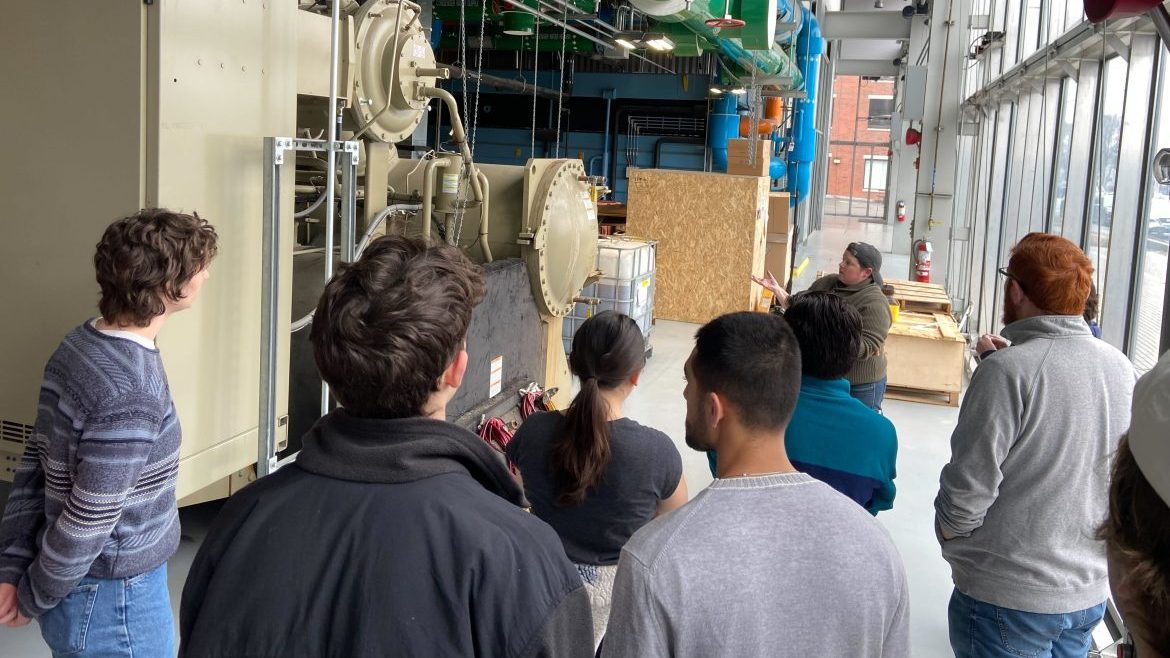Engineering Students Studying Ground-Source Heat Pumps Tour Central Energy Plant
Wednesday, April, 10th, 2024 Curricular Engagement News

Aoife Schmitt (A24) is part of an undergraduate capstone class examining the feasibility of installing ground-source heat pumps on Tufts’ Medford/Somerville campus. Aoife and her project team are looking at the current design of upper campus and the number of wells that could be installed underneath the ground, as well as the number of heat pumps that could be connected to these wells. Thinking about the challenge of integrating a new energy technology into Tufts’ existing energy systems, Aoife said, “Instead of reinventing a whole new system, we’re seeing if we can use parts of what’s in the existing system.”
Aoife is in the Civil and Environmental Engineering Capstone Class, which toured Tufts’ Central Energy Plant (CEP) on Wednesday, March 27th, seeing the Medford/Somerville campus’s electricity, heating, and cooling systems firsthand. Some students in the class are investigating the feasibility of installing ground-source heat pumps on campus, an electric-powered, energy efficient heating and cooling technology, and a key strategy of Tufts’ planned energy transition away from fossil fuels.
The CEP was constructed in 2018 as part of Tufts’ decarbonization efforts, replacing a 60-year-old heating plant. Through cogeneration, a more efficient energy generation process than traditional power plants, the CEP burns fossil fuels to create electricity and recovers the extra heat given off during combustion to produce heating and cooling for campus buildings. In addition, the CEP now generates onsite electricity for about half of campus. By generating some of Tufts’ power on-campus, the CEP can continue producing energy in instances where the power grid is down, thus improving the resilience of the Medford/Somerville campus against power outages.
Professor of the Practice Eric Hines, who teaches the capstone class, is working with the Office of Sustainability to focus the class’s capstone project on the installation of ground-source heat pumps on campus. Switching to this low-carbon energy source, which uses the temperature of the ground to make heating more efficient, would reduce energy loss and advance Tufts’ goal of achieving net-zero carbon emissions by 2050. On this tour, the capstone class examined the current energy system on campus and learned about what is required to transition existing systems to low-carbon energy sources.
Three of the class’s student teams are examining the feasibility of various components of ground-source heating. Andrea Woelfel, Manager of Plant Operations at the CEP, and Elliott Miller, the CEP’s Manager of Maintenance Planning and Engineering, met with the student teams to talk about the plant’s efficiency measurements and different terminologies used in the energy sphere. Professor Hines addressed the importance of understanding both the technical aspects of the work involved in the energy transition and learning how to communicate that with others, especially as people in the industry can used different measurements and language.
Though the tour showed the class the complex nature of the heating and cooling system on campus, Aoife said it offered valuable insights into the complicated problem solving required to address the problem of transitioning to low-carbon energy sources.